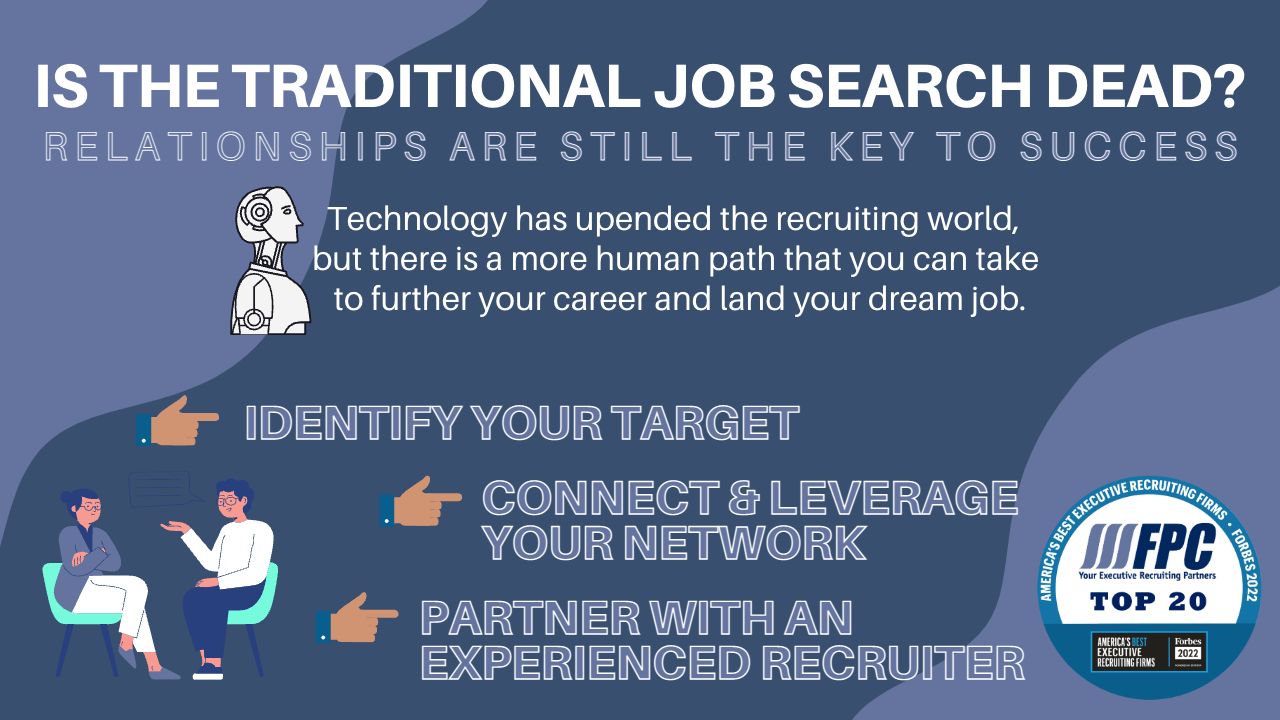Is the Traditional Job Search Dead?
Job Seekers
Spoiler alert: No, it’s alive and well. And here’s how you can make it work for you:
As technology progresses, more and more companies are relying on tools and AI to automate and streamline critical human resources functions. While technology is often helpful for increasing efficiency and lowering costs, it also can have the side effect of dehumanizing the process.
The adoption of applicant tracking systems (ATS) had upended the recruiting world, enabling companies to manage a large volume of applications without having to personally screen every one of them. Often, job seekers struggle to identify the “correct” keywords to use so their resumes will be noticed. Many resumes never make the cut and end up unseen amid thousands of other resumes in the database.
Fortunately, there is a more human path that job seekers can take to further their careers and land their dream jobs. Many of the same principles that worked in decades past are still relevant and effective. Let’s take a look at how this can work for you.
Focus
Let’s not forget the fact that hiring decisions are made by humans, not machines. As we say at FPC, “It’s all about the people.” The issue, however, is getting past the machines to the decision makers.
The first step to humanizing the job-search process is to identify your target. This means making tough decisions to narrow your focus. Nobody likes to limit their options, but refusing to limit your job search to a particular specialty will only make your job search more cumbersome and less effective. Once you have determined your focus, you can begin to hone your messaging, prepare your job-search materials, and identify target companies and opportunities.
Next, make a list of your requirements for your next role. These may include industry type, salary levels, work environment, hybrid/office options, commuting distance, benefits, and other factors.
Start researching companies and make a list of those that fit your criteria. Then, identify the people within each company who are most likely to be involved in the hiring process for your role. While this may include HR professionals, you should focus on finding the people you would be reporting to at each company. This includes immediate supervisors as well as those in leadership roles who are two and three levels above your position. For C-suite candidates, identify those who hold other C-level roles within the company.
Begin with a half-dozen companies and then expand your list in time. Pursuing these companies and contacts will enable you to launch a proactive job search and lessen your reliance on job boards.
Connect
Take a look at your list of targets. The leaders you have identified as decision makers are the people with whom you need to connect. You can either reach out to them directly or use your network to make an introduction.
LinkedIn is a terrific source for connecting with people and companies. When you pull up a prospect’s profile, LinkedIn displays your mutual connections. One way to make a connection is to request an introduction from one of your mutual contacts. You can also reach out directly to your target by sending a connection invitation.
Once someone accepts your invitation, you are in a good position to get noticed by them. Your connections can see the content you publish and the posts you like on the network, thereby putting you on their radar. You can also interact with any content they publish by including insightful comments on their posts. In addition, you now have an open line of communication with a decision maker at your target company. Handled correctly, you can initiate a conversation that could lead to a discussion about employment opportunities.
Be tactful when reaching out to hiring managers, as a direct inquiry about job openings may seem pushy and inappropriate for a first contact. Once a dialogue has been established, however, you can gently introduce the idea of discussing their company and your background.
Relationships are, and have always been, the key to success when it comes to looking for a new job. Those who focus exclusively on job boards are missing out on opportunities to inject a personal touch into the process.
Partner
As the job market grows more complex, it has become increasingly difficult for candidates to navigate their job searches effectively on their own. Many of the better opportunities cannot be found on job boards or even on company websites. This is why it has become essential to partner with a professional recruiter when launching a job search.
With their high-level contacts and knowledge of your industry, professional recruiters can help job seekers gain access to the “hidden” job market, where unadvertised opportunities are available only to those with insider contacts at target companies. The right recruiter can help facilitate introductions and put you in front of the right decision makers.
With more than 60 offices nationwide, hundreds of professional recruiters, and expertise in 40 specialties, FPC National has been the top choice for many job seekers and companies for decades. Connect with your local FPC office today to get started on your job search.

